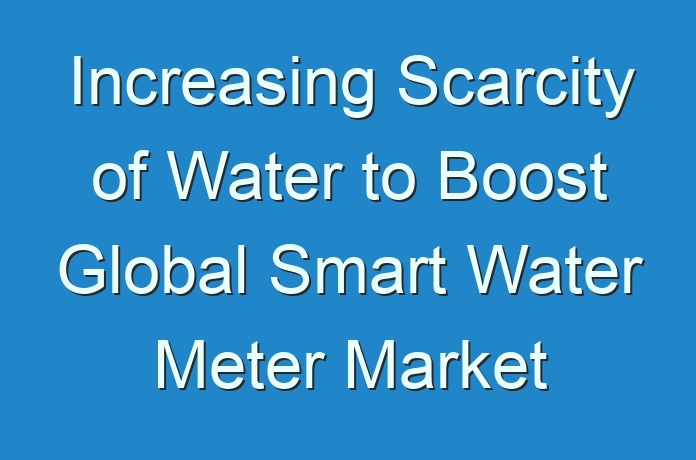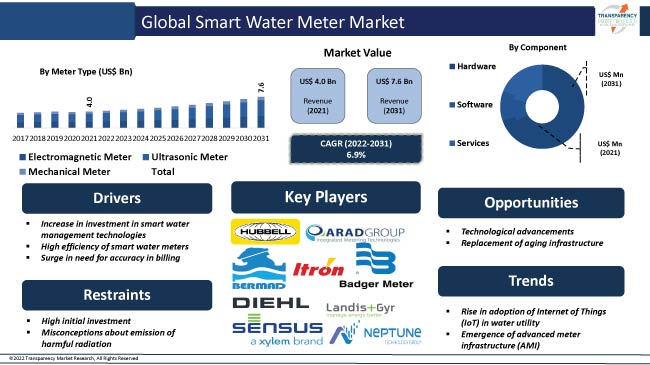
According to a new market research report published by Transparency Market Research titled ‘Smart Water Meter Market (Technology: Ultrasonic Meter, Electromagnetic Meter, Mechanical Meter [Rotary Piston, Single-jet, Multi-jet, Combination, Nutating Disk, and Woltman]; Application: Residential and Commercial/Industrial; and Meter Type: One-way Meter and Two-way Meter) – Global Industry Analysis, Size, Share, Growth, Trends, and Forecast, 2018–2026,’ the global smart water meter market is expected to reach 81.52 million units, in terms of volume, by 2026. The market is projected to expand at a CAGR of 13.42% from 2018 to 2026. According to the report, the global market is expected to continue to be influenced by a range of factors in the near future, such as rising penetration of smart water meters, growing popularity of IoT networks, rising development of the smart city infrastructure, and increasing water scarcity issues across the globe. Asia Pacific is estimated to continue to lead the global market, with the market in the region expanding at a CAGR of above 15% during the forecast period. Prominent economies in Asia Pacific such as China, Japan, India, Australia, and South Korea are adopting smart water meters increasingly.

Ultrasonic meter and electromagnetic meter technology segments estimated to be highly lucrative
Based on technology, the global smart water meter market has been divided into ultrasonic meter, electromagnetic meter, and mechanical meter. The mechanical meter segment has been sub-classified into rotary piston, single-jet, multi-jet, combination, nutating disk, and woltman. Ultrasonic meter and electromagnetic meter segments are expected to expand at CAGRs of 15.02% and 14.54%, respectively, during the forecast period. The water meter technology is changing rapidly and utility companies as well as individuals are giving preference to ultrasonic and electromagnetic smart water meters. This is because these meters do not have any moving part, which makes the device maintenance easy. Furthermore, smart water meters allow significant precision in meter reading, due to their superior mechanism. Additionally, these meters are low at production cost and they use the existing cellular networks efficiently for communication with users.
Request for sample:
https://www.transparencymarketresearch.com/sample/sample.php?flag=S&rep_id=32777
Two-way meter segment projected to expand at a rapid pace
In terms of meter type, the smart water meter market has been segmented into one-way meter and two-way meter. One-way smart water meters allow one-sided communication that allows the user to get the meter reading remotely with the help of drive-by and walk-by methods. One-way smart water meters are based on the AMR (automatic meter reading) system. However, AMR-system-based one-way smart water meters are older-technology products and they are rapidly getting replaced by two-way smart water meters based on the AMI (advanced metering infrastructure) system. Two-way smart water meters offer two-way communication and several other benefits over one-way smart water meters. Along with the capability of remotely collecting the meter reading, they also allow users to get notifications pertaining to the smart water meter battery as well as any kind of water meter malfunction. Moreover, users can send instructions to smart water meters.
North America to continue to hold a major share of the global smart water meter market
North America is expected to hold a major share of the global market for smart water meter during the forecast period. Leading share of the region is primarily attributable to strong presence of well-established players across the region, especially in the prominent economy i.e. the U.S. Moreover, the U.S. Government is investing heavily in deploying innovative smart water meters in place of older water meters across the country. North America is home to several well-established players that manufacture smart water meters, including Badger Meter, Inc., Sensus USA Inc., and Itron Inc. Furthermore, the region is witnessing high adoption of smart water meters due to continuously increasing government investments in the region. Several manufacturers in the region are focusing on enhancing the quality of their quality and developing innovative products to capture a wide customer base. For instance, in June 2018, Itron Inc. introduced an innovative product called Itron Intelis smart water meter at the AWWA Conference. Itron Intelis smart water meters offer additional water management capabilities and advanced metering infrastructure (AMI) through Gen5 networks and Itron’s interoperability.
Buy Now:
https://www.transparencymarketresearch.com/checkout.php?rep_id=32777<ype=S
A large number of sensors installed on sinks, showers, dishwashers, sprinklers, bathtubs, and washers provide data on customer water usage. Customers are able to gain access all of the data obtained from the Internet of Things by utilizing their existing smartphone applications and Wi-Fi network. Big data has a lot of advantages for these metres, which is likely to bolster growth of the global smart water metre market. It quickly detects leaks caused by inconsistencies in the system’s understanding. Through installation systems, big data optimises water distribution and production. Despite the fact that the technology is still in its infancy, it has the potential to open up entirely new vistas in a variety of directions.
Ask for brochure:
https://www.transparencymarketresearch.com/sample/sample.php?flag=B&rep_id=32777
Increasing Use of these Water Meters to Optimize Water Usage and Minimize Wastage
With escalating demand, augmented stress of water, increasing prices of energy, and deteriorating water systems add pressure on water utilities, smart water network solutions have come up that offer substantial benefits by blending efficient communications systems, efficient, and advanced metering technology. End users can account for every drop and turn water into revenue, thanks to the integration of the aforementioned components, which allows for unprecedented data acquisition and improved leak detection. The scarcity of capital funding is likely to come up as a significant impediment for the expansion of the global smart water meter market in near future. In addition to that, smart water metering comes with a hefty price tag in terms of running costs. As a result, many water utilities are cash-strapped and must spend a significant portion of their budgets on network maintenance just to keep things running.
Read Our Latest Press Release:





